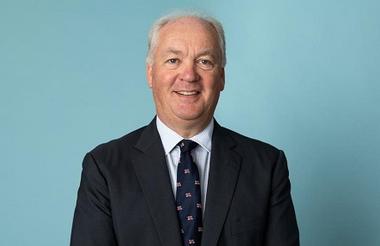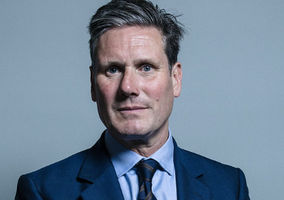Mark Dowie joined RNLI as its chief executive in 2019 after the “longest serving apprenticeship” for the role.
Starting his career as a Royal Navy officer, Dowie has always had an affinity with sailing, moving onto roles in finance and banking before becoming a volunteer for the RNLI.
He spent two years volunteering at Salcombe Lifeboat Station, before becoming CEO.
During that period, he was responsible for running the training, operations, fundraising and management work.
“You represent the RNLI in your local community. And so it was a wonderful preparation for what I now do on an international scale.
“I loved doing it, and I can't go back to it because the fella they've got to replace me is much better and he's not standing down, but I’m going to go back to volunteer in the lifeboat shop,” he says.
“When this came up, I felt that I could use what I've learned in other bits of my career to make a difference and in a way, I felt when I started the role here that I'd been serving the longest apprenticeship in history to prepare for some of the challenges here.
“But I'd also had the wonderful opportunities to look at things from the other end of the telescope, as if you've been a volunteer it gives you a perspective.”
After five years in post, he will be passing the baton to former Navy officer and CEO of the UK Hydrographic Office Peter Sparkes on 26 June.
Last week, Dowie was made a Commander of the British Empire (CBE) in the King’s Birthday Honours list.
Eight more staff and volunteers from the RNLI were recognised for their contributions to the charity, which turned 200 this year.
Discovering he had been awarded a CBE was “very humbling” and “quite a surprise”, he says.
“But really, I see it as a broader recognition for the RNLI for the last five years – so I'm very touched.”
‘Certainly hasn’t been a walk in the park’
Dowie says there have been 14 people that have led the RNLI in the 200 years it has operated as a charity. During the same time, there have been 58 different prime ministers of the UK.
“We have had to ride through changing political landscapes and all sorts of challenges”, he says.
Asked about how the sector has changed during his time as CEO, Dowie says “everything's changed, but everything's the same, too”.
“The RNLI’s been around for 200 years. We’ve been through all sorts of challenges, and some more extreme than the global pandemic. Two world wars. For us, we're active in all of the island of Ireland. So, Ireland becoming a separate country in the early 20th century was also a huge change.
“But throughout all of that, we've had a very singular purpose which our founders set out in 1824, and we haven't deviated from it.
“I think the environment has changed a bit. The purpose hasn't. We've had to adapt the way we deliver things in some ways.
“We've had to cut our cloth to meet the changing financial environment as well. But we've stuck very clearly to our purpose throughout the last five years and that served us well.”
Dowie notes 30% of staff were furloughed during the pandemic. At the time, he took a 50% pay cut as part of the charity's coronavirus plan.
Most turbulent years in RNLI history?
Recently, the chair of RNLI, Janet Legrand, said: “The past five years have been some of the most turbulent in the RNLI’s 200-year history, and the RNLI has been so fortunate to have Mark at the helm to navigate these challenges.”
Dowie says that the combination of challenges the charity has faced in such a short period of time has been a “significant challenge”.
He explains the pandemic, cost-of-living crisis and the war in Ukraine have all had an impact on the organisation, with the Covid-19 pandemic casting the largest shadow as RNLI had to go virtual overnight.
“Also, some of the quite severe tactical things we’ve had to deal with small boat crossings in the English Channel, some of the focus on our international challenges have presented significant challenges.”
While he says he is not sure whether he agrees with the chair’s opinion that it’s been the “most turbulent” five years in the RNLI’s history, he admits: “It certainly hasn't been a walk in the park.”
Receiving complaints
RNLI was the second most complained about charity in Civil Society’s recent analysis of the 50 largest fundraising charities, receiving 1,105 complaints for the year ending December 2022.
Dowie says that the charity sent out around 32 million pieces of fundraising and marketing material in the year, meaning there is one complaint per 18,000 pieces of material, and he would be “astonished” if they did receive no complaints due to the charity’s high profile.
“The numbers are minuscule compared to the activity that we're undertaking to fund our purpose,” he says.
RNLI has also experienced instances of inverse giving, where the charity has experienced a hike in donations in response to negative press.
The charity has been dragged into political conservations in recent years, particularly due to its rescue activity involving small boats crossing the English Channel.
When asked about this, Dowie says he believes the public agree with the charity’s purpose, which is shown through the “consistent support” the RNLI has received for 200 years.
“Our volunteers are normal everyday people who have families and jobs and all the rest of it and yet they choose to spend part of their time often putting themselves in quite difficult situations to save lives at sea.
“I think that's it's a natural emotion to want to support that sort of selflessness.”
Small boat crossings
“What we're doing in the English Channel is humanitary. Humanitarian rescue work which we are tasked by now His Majesty's Coast Guard to go to distress. We are always going to do that.
“We were doing that in the Second World War for German airmen. The purpose of the charity is to save lives at sea.”
He outlines that of the 238 lifeboat stations the RNLI manages, only eight are involved in rescue activity related to small boats crossing the English Channel.
While Dowie understands the issue surrounding small boat crossings is “polarising” and people have strong feelings on either end of the political spectrum, he believes these feelings are irrelevant to the charity’s mission.
“For me, it's just abundantly clear that we are there to save lives at sea, and that, frankly, is the end of it.”
Retiring
Dowie says he has spent his 43-year working career very busy and has a diary that is “absolutely jam-packed from morning until night and includes the weekends quite often, particularly in this role”.
Dowie says: “I'm a great believer in the five-year cycle. You come, you set out your store, you deliver it, you check it's working, and then you start preparing the ground for the next change.
“I'm 63 now so it was I knew it would be about time when I came to this point.”
Dowie will be going back to volunteer for Salcombe Lifeboat Station in its shop when he leaves his post next week.
He will remain serving on the board of the Brittania Association, the Royal Navy and working closely with the Royal Navy Royal Marines charity.
Dowie says he hopes to have some fun as well.
“I'm looking forward to waking up in the morning occasionally and wondering to myself, 'What am I going to do today?' That will be a novel experience for me.”
Related Articles












